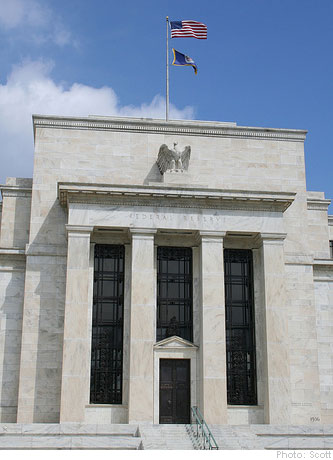 The Federal Reserve Bank of New York said Monday, that it is expanding its testing strategy regarding reverse repurchase agreements (Repos) to shrink its trillion-dollar portfolio of mortgage-backed securities.
The Federal Reserve Bank of New York said Monday, that it is expanding its testing strategy regarding reverse repurchase agreements (Repos) to shrink its trillion-dollar portfolio of mortgage-backed securities.
The central bank emphasized the fact that the move, which could be used to support a reduction in monetary accommodation at the appropriate time, was strictly designed as a test to drain liquidity from the financial system – known as ‘revers repos’.
“These forthcoming operations are being conducted to ensure operational readiness at the Federal Reserve, the triparty repo clearing banks, and the primary dealers,” the bank said in a statement. “The operations have been designed to have no material impact on the availability of reserves or on market rates.”
Last month, Fed officials confirmed that they were working internally and with primary dealers on operational aspects of triparty repo agreements to ensure that this tool will be ready if the FOMC decides it should be used as an exit strategy from emergency measures adopted during the height of the financial crisis. The Fed also said that in the coming weeks, this early testing will be extended to include small, real-value transactions.
“Like the earlier rounds of testing, this work is a matter of prudent advance planning by the Federal Reserve,” the NY Fed said in its statement. “It does not represent any change in the stance of monetary policy, and no inference should be drawn about the timing of any change in the stance of monetary policy in the future.”
Dealers expect the operations to total less than $1 billion at a time, but that remains still a subjective amount since there is uncertainty as to how large the reverse repos will be.
Today’s move demonstrates once again that the Fed’s preparations of bringing monetary policy back to normal by draining liquidity are becoming more concrete.
The Fed’s support of the financial system since the end of 2007 has resulted in the creation of vast excess reserves in the banking system, prompting the agency’s balance sheet to double to more than $2 trillion since September 2008.
- Bulenox: Get 45% to 91% OFF ... Use Discount Code: UNO
- Risk Our Money Not Yours | Get 50% to 90% OFF ... Use Discount Code: MMBVBKSM
Disclaimer: This page contains affiliate links. If you choose to make a purchase after clicking a link, we may receive a commission at no additional cost to you. Thank you for your support!

Leave a Reply